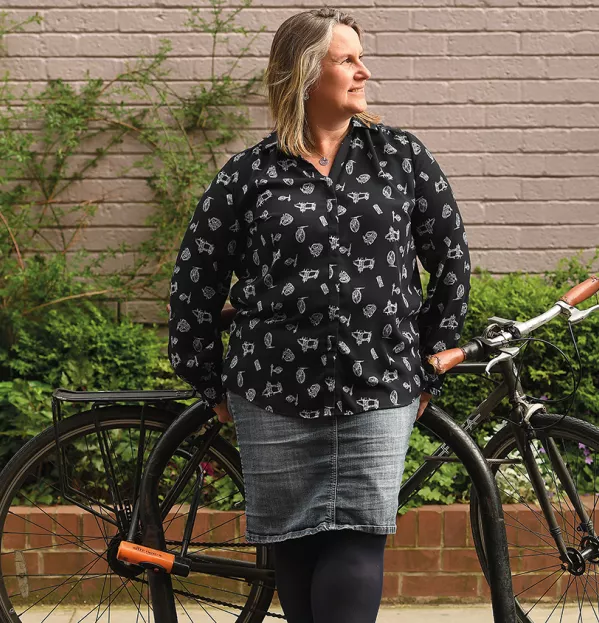‘We should be ashamed that these children are being excluded’

Jules Daulby left school at 16 with a few CSEs and not one O level to her name.
Now she is a qualified teacher, an expert in mainstream special educational needs and disability (SEND) and literacy, and director of education at the Driver Youth Trust - a charity that focuses on supporting children with literacy-based learning difficulties.
Her mission is to give teachers confidence to work more effectively with pupils with learning differences in mainstream settings.
She is also passionately opposed to the increasingly well-worn route of exclusion experienced by many pupils with SEND, and the sense of rejection this entails.
And Daulby knows a thing or two about rejection. Born and raised in Kent, she was a borderline case for grammar school, like her brother before her. He was accepted; she ended up in a “quite rough” secondary modern.
Failing the 11-plus, Daulby says, left her “very disillusioned and disaffected” and doubting her intelligence.

Traces remain today. “I‘m very self-deprecating and make jokes all the time,” says Daulby. “I think that is from going to a secondary modern and constantly defending yourself and feeling that you’re not quite up to scratch with everybody else.”
Nonetheless, Daulby is fluent, confident and vocal. Her speech has a tendency to jump along to catch up with her quick thinking, resulting in the odd unfinished sentence.
Having carried out master’s-level training in assessing dyslexia, attention deficit hyperactivity disorder (ADHD), and autism spectrum disorder issues, Daulby thinks she “probably” has ADHD; she struggles with sequencing, has a short attention span but can also “hyper-focus”, she explains. “I will say I’ve definitely got learning differences, so I was never particularly academic.”
Her track record since school proves, if proof were needed, that having a learning difference is in itself no barrier to success.
She left school with “no ambitions at all”, sat some O levels at college - passing only two - then did various jobs, including a stint as a group leader on a children’s activity camp in France, where she met her future husband.
As she mingled with graduate colleagues, it dawned on her that she had much in common with her more educated peers. Buoyed, she resolved to become a teacher.
By then aged 21, she acquired the requisite exams to go to university, secured a BA Honours degree and went to Homerton College, University of Cambridge, to do her teacher training.
After three years as an English and theatre studies teacher - during which time she became deputy head of the sixth form at Purbeck School in Wareham, Dorset, after just 12 months - Daulby moved to the Falkland Islands when her husband took a teaching job there. Since other teaching opportunities were sparse, Daulby ended up working as a broadcast journalist and radio news presenter instead.
SEND champion
When the couple returned to England two years later, Daulby took on two jobs: working at Parent Partnership (a helpline for parents with children with SEND run by the Dorset local authority) and as an English lecturer and support tutor at Kingston Maurward further education college in Dorchester. In the former role, she heard the same stories time and again of children misunderstood by their schools who would end up misbehaving and being excluded. In the latter, she saw the impact on learning of 16-year-olds whose illiteracy had been ignored throughout their school years.
Daulby became a specialist advisory assessor, then a literacy and language lead within a comprehensive school in Dorset.
Her own issues with sequencing mean that she struggles with long written tracts but is good at short messages - a skill she uses to great effect on Twitter and through blogs. This is how she came to the attention of Sarah and Mark Driver, who have four children, three of whom have dyslexia.
Their charity, the Driver Youth Trust, provides training for teachers and helps schools to identify children with literary difficulties as early as possible and ensure they can succeed and stay within mainstream education.
What angers Daulby is that children with SEND are seven times more likely to be excluded from school. What’s more, the majority of pupils who end up in pupil referral units have literacy difficulties, she says.
Too many children are falling through the net of early intervention, she argues - often those from disadvantaged backgrounds, who don’t have the parental backing to lobby for a diagnosis, or who lead “complex lives”.
“They might have a dad in prison and they’ve been suddenly taken away from their mum who is a drug addict, so all of a sudden the idea that they can’t read and write has got lost among other things,” Daulby explains.
Those struggling with unidentified learning differences fall further and further behind as they fail to access the curriculum. Boredom, shame, or a sense of failure can ensue - sentiments that Daulby can relate to.
“For kids who can’t read and write, they are incredibly embarrassed about it, or ashamed,” she says. “And often they don’t realise they have dyslexia or something. They often think they are stupid.”
Too many of these children end up then being excluded from school. But exclusion, she says, should be the “last resort”, even for children whose behaviour is extreme, such as a pupil dealing drugs or carrying a knife - a point she made forcefully in front of the Commons Education Select Committee recently during an inquiry into alternative provision.
Daulby told MPs that school zero-tolerance policies need more “flex” because the majority of exclusions were sparked by the persistent disruptive behaviour of children who were likely to have SEND and literacy difficulties.
“I wonder how normal you have to be to be in a mainstream school, because the threshold seems to have got lower and lower,” she says. “So if you’re quirky in any way, unless you’re kind of perfect, then you don’t seem to be in the mainstream, and that’s not what mainstream school is about.
“It should be for the majority of children other than those last resort knife-wielders.”
She adds: “We should all be ashamed that these children are being excluded from school, because they are the ones that need it the most. And we also know the impact on them is the pipeline to prison or to unemployment, and so it is a societal issue. It will affect us all in the end.”
Part of the charity’s remit is to help teachers to identify “non-responders” - pupils whose learning disability is so severe that they will never learn to read and write and will need support to access the curriculum, such as using assistive technology.
“One of my students has come out of university with a first, is doing a PhD, and still can’t read and write,” says Daulby.
Instead of being segregated, children with learning difficulties should be kept in mixed-ability classes so that they can absorb language from others, but receive “high-quality intervention” for half an hour a day, she argues.
Ultimately, every teacher is a teacher of SEND pupils, and of literacy, says Daulby. She thinks that all teachers should work in a special school, or as a teaching assistant for a couple of weeks, or with children with learning difficulties as part of their training and CPD.
And she would like to schools to be encouraged to prize inclusivity.
Daulby says schools that seek to improve their Ofsted rating by excluding a large number of children should be held accountable down the line for the pupils they exclude.
And if policymakers visited more inclusive schools, they might just be surprised, she says. “The inclusive schools that don’t exclude often and have high levels of free school meals and SEND are often very calm places,” she adds. “People don’t see that sometimes.”
You need a Tes subscription to read this article
Subscribe now to read this article and get other subscriber-only content:
- Unlimited access to all Tes magazine content
- Exclusive subscriber-only stories
- Award-winning email newsletters
Already a subscriber? Log in
You need a subscription to read this article
Subscribe now to read this article and get other subscriber-only content, including:
- Unlimited access to all Tes magazine content
- Exclusive subscriber-only stories
- Award-winning email newsletters